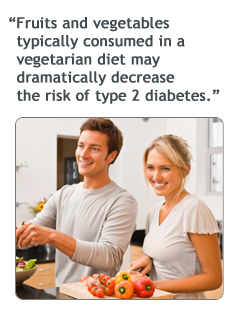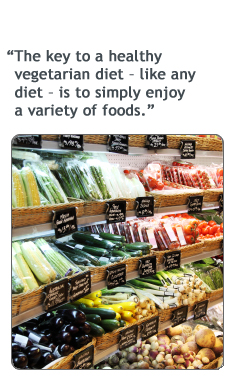You know you should eat more vegetables, but -- let's face it -- you are never going to give up steaks and burgers. Besides, you may be convinced eating vegetarian-style is simply boring.
Actually, trading your usual meat-centered dinners a couple of times a week for vegetarian fare may be far easier, and tastier, than you've imagined. You could even find you don't even miss those steaks and burgers after a while.
What's more, going vegetarian for even part of the time will provide you with extra phytochemicals, fiber and other health-boosting components of plant-based meals. Still not convinced more veggie-centered and meatless meals are worth the effort?
Consider these recent studies:
- Loma Linda University researchers have found the fruits and vegetables typically consumed in higher amounts in a vegetarian diet may dramatically decrease the risk of type 2 diabetes.
- Recent data from Harvard University researchers showed that replacing saturated fat-rich foods such as meat and full-fat dairy products with vegetable oils, nuts and seeds can reduce the risk of heart disease by almost 20%.
- Hundreds of studies have found links between meat consumption and cancer. For example, the National Institutes of Health (NIH)-AARP Diet and Health Study concluded that the more meat you eat, the higher your risk for esophageal, colorectal, liver and lung cancer.
- According to the large European Prospective Investigation into Cancer and Nutrition (EPIC) study, vegetarians are a third less likely to get a common bowel disorder, diverticular disease, which affects the large bowel or colon and can cause painful abdominal cramps, bloating and gastrointestinal upset.
- People on low-meat or vegetarian diets have significantly lower body weights and body mass. What's more, a recent study from Imperial College London also found that cutting back on overall meat consumption can prevent long-term weight gain.
Maybe it's time to be a "flexitarian"
Polls show that an increasing number of Americans are opting to become vegetarians (eating no meat, but consuming eggs and dairy products) or vegans (eating no animal products at all). There's also a move toward flexitarianism -- that is, eating meat only once in a while.

A recent poll by National Public Radio (NPR) and Truven Health Analytics of 3,007 participants found that almost 40% of Americans have started eating less red meat in the past three years. When asked why they cut back, 66% said that they were concerned about the impact of meat on their health.
On the other hand, some people hesitate to turn to a vegetarian or mostly vegetarian lifestyle because of concerns they'll miss out on crucial nutrients. Fortunately, according to the Mayo Clinic, the key to a healthy vegetarian diet -- like any diet -- is to simply enjoy a variety of foods. Even vegans, who eat a more restricted diet containing no animal products, can obtain all necessary vitamins and minerals with some planning. For example, essential omega-3 fatty acids are important to health and abundant in fatty fish like salmon. But omega-3s are also available in vegan supplements containing microalgae oil. Flaxseed oil and walnuts also provide important essential fatty acids.
Vitamin B12 is found in dairy, eggs and seafood, as well as meat. So, unless you are a vegan, you should have no trouble getting enough B12 in your diet (vegans can take supplements). Likewise, calcium is plentiful in dairy products, but also in calcium-fortified tofu, root vegetables, legumes and fortified soy milk.
Whether you are considering giving up meat and/or all other animal products or simply want to become a flexitarian and eat more plant-based meals and fewer meat-centered ones, you can ease into new eating patterns by going meatless one or two days a week. For motivation (as well as yummy recipes), visit the Meatless Monday campaign web site (www.meatlessmonday.com). A non-profit initiative launched in 2003 in association with the Johns Hopkins' Bloomberg School of Public Health, the Meatless Monday group is working to reduce individuals' meat consumption by 15% in order to improve personal health and the health of the planet. The program is now active in 23 countries.

Explore vegetarian cuisine
One way to make eating more plant-based meals appealing is to explore international vegetarian entrees -- from veggie lasagna and baked ratatouille to Thai spicy tofu, Escalivada (Catalan roasted vegetables) and countless more. Worried about giving up your favorite American meat dishes? Give vegetarian versions a try and you may find the non-meat versions are even tastier -- and just as easy to prepare.
A case in point: Garbanzo bean burgers recipe
(Makes 6 burgers)
Ingredients:
- 2 cups (cooked) or two 19-ounce cans of garbanzo beans (chickpeas), drained and mashed
- 1 chopped stalk of celery
- 1 chopped carrot
- 1/4 cup small onion, peeled and finely chopped
- 1/4 cup whole wheat flour
- Salt and pepper to taste
- 2 teaspoons olive oil
- Mix all ingredients together, except for the oil.
- Form 6 flat patties. Cook in an oiled pan over medium-high heat until the burgers are golden brown on both sides.
- Serve alone or with ketchup, mustard or barbecue sauce.
For more quick, easy and delicious veggie recipes, visit the non-profit Vegetarian Resource Group online at http://www.vrg.org/.


